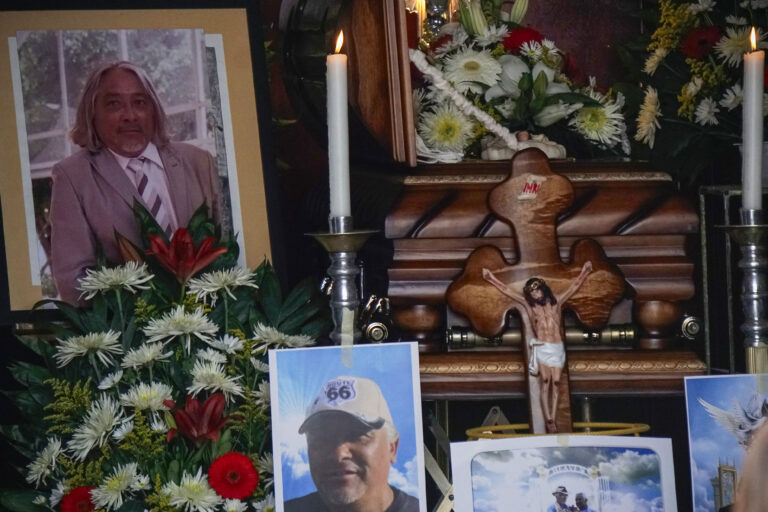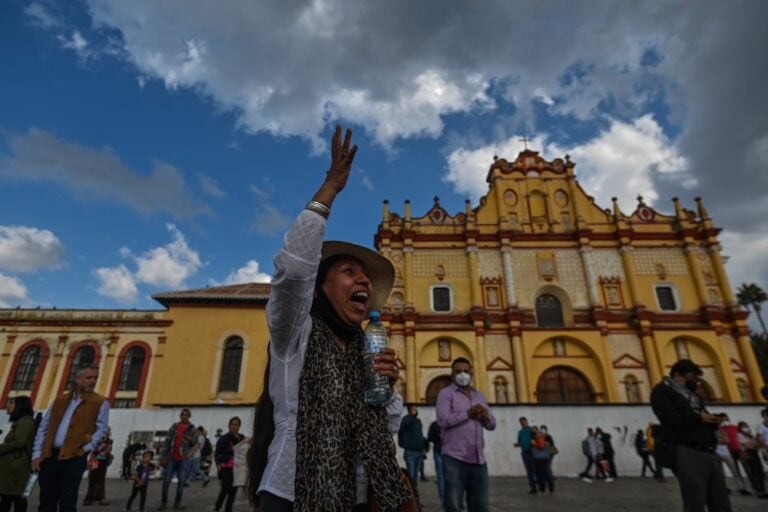(IAPA/IFEX) – The following is a 21 October 2003 IAPA press release: IAPA welcomes Mexico’s commitment to solve crimes against journalists IAPA and Mexican government see it as possible to reach “follow-up agreement” to put an end to impunity in the murders of Héctor Félix Miranda and Víctor Manuel Oropeza WASHINGTON, DC (October 21, 2003) […]
(IAPA/IFEX) – The following is a 21 October 2003 IAPA press release:
IAPA welcomes Mexico’s commitment to solve crimes against journalists
IAPA and Mexican government see it as possible to reach “follow-up agreement” to put an end to impunity in the murders of Héctor Félix Miranda and Víctor Manuel Oropeza
WASHINGTON, DC (October 21, 2003) – The IAPA yesterday welcomed the expression of readiness by the Mexican government to reach a “follow-up agreement” between the two parties to pursue investigations into the murders of two Mexican journalists. The talks took place during a hearing of the Inter-American Commission on Human Rights (IACHR) in Washington.
The hearing was chaired by IACHR President José Zalaquett, who was accompanied by IACHR member Robert Goldman, Executive Secretary Santiago Cantón and Special Rapporteur for Freedom of Expression Eduardo Bertoni.
The IAPA, as petitioner, submitted new details to the IACHR and the Mexican government on the extent of impunity surrounding the cases of journalists Héctor Félix Miranda and Víctor Manuel Oropeza, murdered in 1988 and 1991, respectively. In the case of Félix, the mastermind behind the crime has not been identified, while in the case of Oropeza neither the mastermind nor those who carried out the murder have been identified. Both cases have been under investigation by the IAPA since 1995, when it launched its Unpunished Crimes Against Journalists project.
The cases were taken up by the IACHR in 1999, the year in which that agency noted that the Mexican state had an “international responsibility” due to the delay in justice being carried out and the violation of the right to freedom of expression and to legal guarantees and protection under the law, to the detriment of the victims’ family members.
The IAPA delegation, represented by Roberto Rock, vice president of El Universal, Mexico City, Mexico; Phil Bennett, foreign editor of The Washington Post, Washington, D.C.; and IAPA Press Freedom Director Ricardo Trotti, complained about the lack of will on the part of the Mexican government to comply with the recommendations that the IACHR had made in 1999. These were: 1. To investigate fully, impartially and effectively so as to determine the criminal liability of all those involved in the murder; 2. To investigate fully, impartially and effectively to determine if there has been any cover-up or offense against the administration of justice, including the possible participation of members of the judiciary, that prevented full investigation of the facts giving rise to this report, and to apply the corresponding criminal, administrative and/or disciplinary sanctions; 3. To provide adequate reparations to the family members for the violations of human rights herein established.
The Mexican government was represented by Juan José Gómez Camacho, human rights director in the Ministry of Foreign Affairs; Patricia Olamendi, human rights deputy director; and, among other delegates, Juan Ignacio Alvarez Ledezma, deputy prosecutor for human rights in the Mexican Attorney General’s Office.
After a session that lasted more than one hour, in which the IAPA and the government voiced divergent positions on the legal proceedings in the two cases, a rapprochement was reached between the parties in a bid to come up with mechanisms for the murders to be solved and thus end decades of impunity.
In the name of the Mexican state, Gómez Camacho, following mediation by the IACHR president, expressed the Mexican government’s willingness to study a proposal for action that the IAPA promised to send in the next few weeks. The Mexican officials stressed that there is a good relationship with the judicial authorities of Baja California and Chihuahua state – where the murders were committed – and therefore they felt the investigations could show progress.
Finally, Trotti declared that the IAPA would send a working paper or “follow-up agreement” to the Foreign Ministry, through the IACHR, which would contain an agenda for action, with objectives and timeframes. He added that it would be essential for any agreement to have the Mexican government’s acceptance of and compliance with the recommendations made by the IACHR.
IAPA President Jack Fuller, of the Chicago Tribune, Chicago, Illinois, and Committee Against Impunity Chairman Alberto Ibargüen, of The Miami Herald, Miami, Florida, welcomed the show of goodwill by the Mexican government and declared that “this could be a great opportunity to combat impunity.”
Ibargüen said that for several years now the IAPA had been asking the Mexican government to regard crimes against journalists as federal offenses so as to provide greater transparency in the judicial process. He recalled that the same conclusion had been reached at the Conference on the Press and Drug Trafficking held by the IAPA in Tijuana, during which a letter was sent to President Vicente Fox calling for his intervention in cases of crimes against journalists and the “federalization” of such cases.


